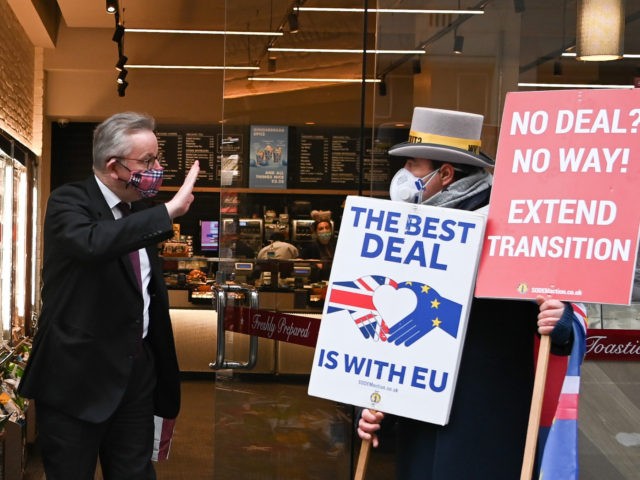Brexit negotiators continued talks over the weekend, which were followed by warnings that “we really are running out of time”, as the so-called transition period that keeps Britain tied to EU rules has just one month to run.
Lead figures in the interminable Brexit deal talks have warned the discussions are now in their “last week or so”. While only the latest time this has been claimed, given the now-looming end of the transition period, the statement is perhaps finally correct.
British government minister George Eustice — responsible for fisheries and food, key areas of disagreement in talks — said on Monday: “We really are now running out of time. This is the crucial week. We need to get a breakthrough.”
Mr Eustace added: “I really do think we are now in to the final week or 10 days. Of course, if great progress were made this week — and you’re nearly there — it’s always possible to extend those negotiations.”
This view was buttressed on Monday by Britain’s foreign secretary Dominic Raab, who said that while there was a “Brexit deal to be done”, nevertheless talks were in the “last week or so”.
Significant roadblocks to progress remain, and appear to have moved little in weeks, if not months. Fishing and how access to fishing stocks in British waters would be apportioned in the post-Brexit era was evidently on the minds of UK political leaders, in particular.
At the moment, British fishermen can only legally land a fraction of the annual catch in British waters. In some sea areas and with some types of fish, UK boats land almost no catch at all. For example, European fishermen land 91 per cent of English Channel cod and 96 per cent of North Sea sole. Overall, European fishermen get more than 60 per cent of all fish by weight from British waters.
While this is a state of affairs the European Union wants to preserve, even after Britain leaves the bloc, the UK government is determined to see that relationship change, and fishing access negotiated annually. If the UK’s proposal were adopted, fishing rights would be re-calculated according to a “zonal attachment” method and decided from London, not Brussels.
Eustice said of this: “All we’re asking for … is there to be annual negotiations based on the science and also for there to be a move towards a fairer, more scientific sharing methodology which is called zonal attachment which is broadly where the fish are to be found.”
The minister said, according to Reuters, the present system was “profoundly unfair” on British fishermen.
Fishing industry spokesmen have dismissed as insulting the European Union’s counter-offer on fisheries. Under it, as an independent nation, Britain’s catch would rise by just 18 per cent, or perhaps even less than that.
Britain’s Daily Telegraph quotes the remarks of one government insider on the proposal, who said: “These figures are risible, and the EU side knows full well that we would never accept this. There seems to be a failure from the Commission to internalise the scale of change needed as we become an independent nation.”
While both sides continue to maintain a positive attitude towards talks in public, the fact remains that the differences between the two negotiating teams — not just on fishing, but also on fundamental areas like whether Britain will be able to set its own laws or remain subject to EU courts in future — are still unsettled and may never be.
Britain left the European Union at the start of 2020, thanks to agreements made earlier in the Brexit negotiating process by erstwhile Prime Minister Theresa May, and the nation has remained in limbo all year, meaning its relationship with the EU has not really changed.
But this period should come to an end on December 31st, and now a few options remain. Either, Britain or the European Union cave to the other and sign a deal. Britain would then leave the EU on New Year’s day, but the degree to which this would have any real meaning, or if Britain had any freedom as a sovereign state, would depend on the text on the deal.
European negotiations have traditionally gone to the wire and it is possible something could be agreed right up until the very last moment before midnight on the final day. While these treaties normally have to be ratified — a process that takes months — the EU has already accepted it is too late for that even now, and the agreement will probably be made official by decree, rather than agreement.
Or, Britain could leave the European Union without a deal at the end of the year. While the UK government and the EU have both said they do not want this to happen, they have also both said they are prepared for it. Britain, in particular, has been bullish on the point that it would still flourish outside the EU without a deal.
Finally, it remains possible that the transition period could be extended again, leaving Britain trapped once more in Brexit limbo: not actually a member of the bloc but nevertheless still subject to Europe’s rules and regulations. British pro-Brexit tabloid newspaper the Daily Express reported on Monday that the European Union has already offered a transition extension to the United Kingdom and that it has been turned down. Boris Johnson said last week that “of course” Britain would not be extending.
Mr Eustace’s comments that time was running out for Brexit talks are just the latest in a long line of such claims going back months, with several deadlines already passed, ignored, and forgotten. In June, EU negotiators were insisting that talks could not possibly roll into Autumn. Discussions have even been declared failed and over — only for negotiators to get back around the table days later, in yet another round.

COMMENTS
Please let us know if you're having issues with commenting.